
12 minute read
Aykut Bozta
Ankara, Turkey
My name is Aykut Bozta , I am thirteen years old and I live with my father, mother, two brothers and two sisters in Altında , Ankara Turkey. My parents moved from De irmendere, Ka ızman when I was about one year old. My grandmother still lives there. She sends us cheese from the old village, for breakfast.”
Advertisement
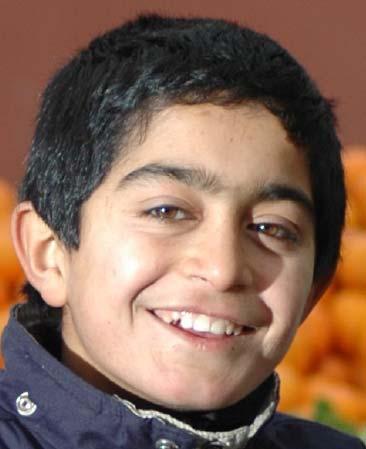
History
Altında municipality, one of Ankara’s most historical districts, includes the oldest “gecekondu” and has some of the poorest neighborhoods, adjacent to the wealthier and most established areas. Since the 1950’s, it has gone through several transformations as a result of economic policies, labor market changes, and political interventions. Despite its stigma as an illegal settlement, built and occupied by unskilled, poor migrants from rural areas, most early observers acknowledged the positive energy of the residents, the orderly social life in these settlements, the mechanisms they had developed for successful adaptation to urban life, and their economic contributions. These positive aspects were also reflected in gradual improvements of the physical environment (Figure 1.1).
Starting in 1966, realizing that the market was unable to meet the growing demand for housing, the government responded by amnesty laws that legalized the settlement and brought city services, resulting in political patronage as well as commercialization of the housing stock. Taking advantage of the opportunity to rent, some areas densified with low- and low- middle income apartments. In the 1980’s, liberalization of the economy by massive privatization; localization of administrative functions; reduction of rural subsidies; social assistance; unionization; and Turkey’s war against terrorism in the east, led to further migration into already existing gecekondus whose original owners rented housing to the newcomers. At the same time, urban land became more precious so that the government stopped legalizing land tenure and began enforcing the demolition of old squatter developments, especially those that were visible along major arterials.
Thus Altında includes older 5-8 storey apartments where low- and middleincome families live, as well as large patches of very dense older squatter homes, especially on steep hill-sides. The early gecekondus allowed for limited continuation of a rural lifestyle, thus contributing to livability as well as productive use of land for vegetable gardens and husbandry to help meet basic needs. However, today, the environment lacks any type of vegetation since every inch has been converted into rentable area for migrant families (Figure 1.2). Ties with the rural hinterland and rural ways of living have been severed.

At the same time, the labor market has become much more specialized, blocking opportunities of family members for upward mobility from marginal jobs into better paying employment. The environment of the more recent immigrants reflects abject poverty, accentuated by the inability of the residents to improve their physical conditions owing to their status as renters. In most of these neighborhoods, more than 80% of the population is unemployed. Aykut lives in one of these neighborhoods (Figure 1.3), an older squatter settlement built on a steep hillside close to the main street of Altında , a few blocks away from apartments on flat terrain where lower and middle-income families live.




The Family
Aykut’s family comes from Ka ızman, Kars, known for its lush vegetation, orchards and animal husbandry. When economic and political factors disrupted the area’s traditional livelihoods, the villagers started looking for permanent work elsewhere. Aykut’s father began to work as a seasonal laborer in Ankara to bolster the household income from animal husbandry, the traditional occupation of the region. Aykut, his mother, older brother, and sister were all born in Ka ızman.
Twelve years ago, when Aykut was one year old, his father decided to move the family to Ankara, near some of his brothers. In the next few years, Aykut’s parents had two more children, while his father continued to work in construction until he had a serious accident on site and was hospitalized. His boss prevented him from going to court for worker’s compensation on the promise that he would take care of expenses. When the statute of limitations passed and his boss did not keep his promise, it left the family with considerable debt and little prospect of finding a steady source of income. Today, they survive on government subsidies for the poor and occasional part-time jobs that the father and older brother find. Aykut notes:
“My older brother is away most of the time looking for work in the city.”
The Home
Aykut and his family live in a second-storey rented dwelling on top of another rental unit. It consists of two rooms accessible from the street by an exterior staircase (Figure 1.4). There is a bathroom/toilet that opens to one of the rooms. Aykut’s father re-built the bathroom, with nice tiles, surplus from a construction site. Laying tiles is his trade. He also regularly repairs the roof.
The space on the landing, protected by a make-shift awning, is used as the kitchen. The total living space for this family of seven is about 40 square meters. They use a coal-burning stove to heat the home (Figure 1.5). The ruling party provides coal as a favor and as part of its campaign for votes.
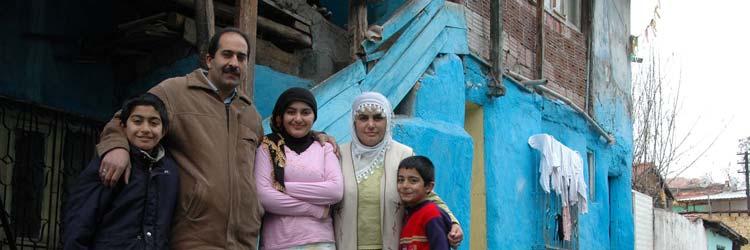

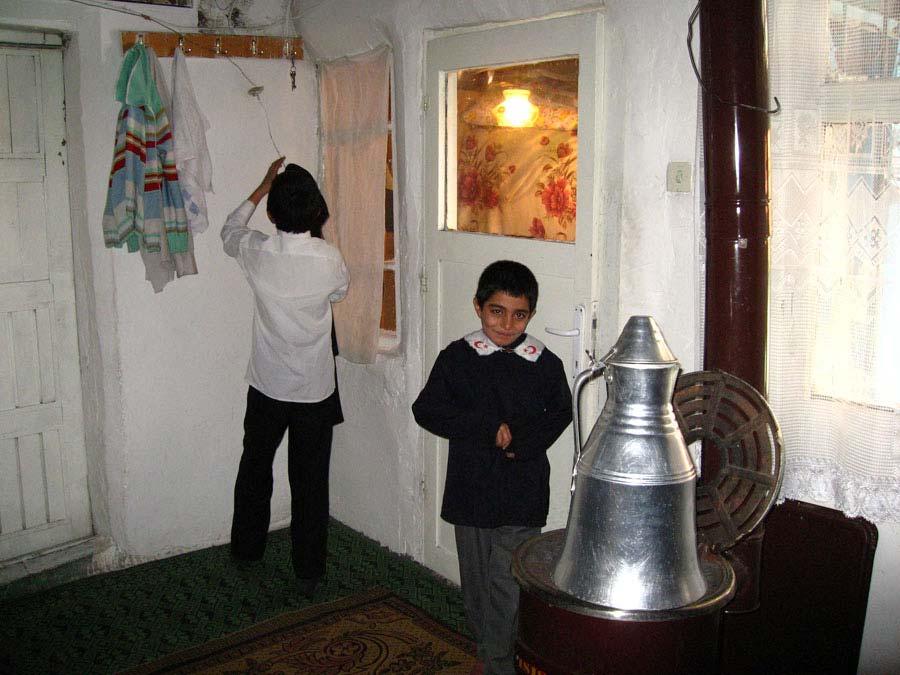
Early in the field work, the rooms did not contain any furniture except for sitting pillows on a bare floor and a small television set. Later, the living room was furnished with two new sofas, a carpet, and a chestnut credenza with a glass display case filled with china and mementoes set on doilies. This furniture was delivered by people who “took interest in the family.”2 The stove is in the living room. The family has dinner here, watches television, and receives guests when they drop in (Figure 1.6).
“Neighbors often come to visit; women with their small children make deserts, like cake, with my mother. People visit each other during holidays. My grandparents live elsewhere in Ankara and we visit them or they come here for holidays. My other grandmother will come from Ka ızman to stay with us.”


As customary in rural areas, dinner is served on a low wooden table and eaten sitting on the floor. The living room also serves as the bedroom for the parents. Aykut explains that their large screen television set was taken away when the family could not pay its debts:
“They took away our large television set because we could not pay back our debt. This is because my father fell from the building on the construction site and was in the hospital for three months. We had to borrow money because he could not work and for his treatment. He cannot work full time in construction anymore and can only do light jobs when they come up. If we could pay back the remaining half of the debt, then we can save money to get our large television back. If I could earn more money, I would like to get my father a cell phone and a laptop for myself.”
In the other room, Aykut sleeps with his two brothers and two sisters. There is an electric heater and a cassette and CD player. They also use it for listening to music, playing, and doing homework (Figure 1.7).
“My brother helps me with math sometimes. Besides homework, we listen to music here in this room with my friends. The children play, work, listen to music, and sleep in this room”.
“My older sister helps my mother with housework and she sometimes fights with my brother; that upsets me while I am doing homework. She is fourteen years old and quit going to school because she did not like the teacher. There are people who made inquiries to find out if she is available for marriage. She says she will not get married until she is at least twenty two years old.3 My baby sister is three and a half years old, she likes to dance and used to ride the tricycle, but that was stolen.”
The family also stores the bedding in this room; which is laid down every evening with mattresses, quilts and pillows that are gathered up in the morning.
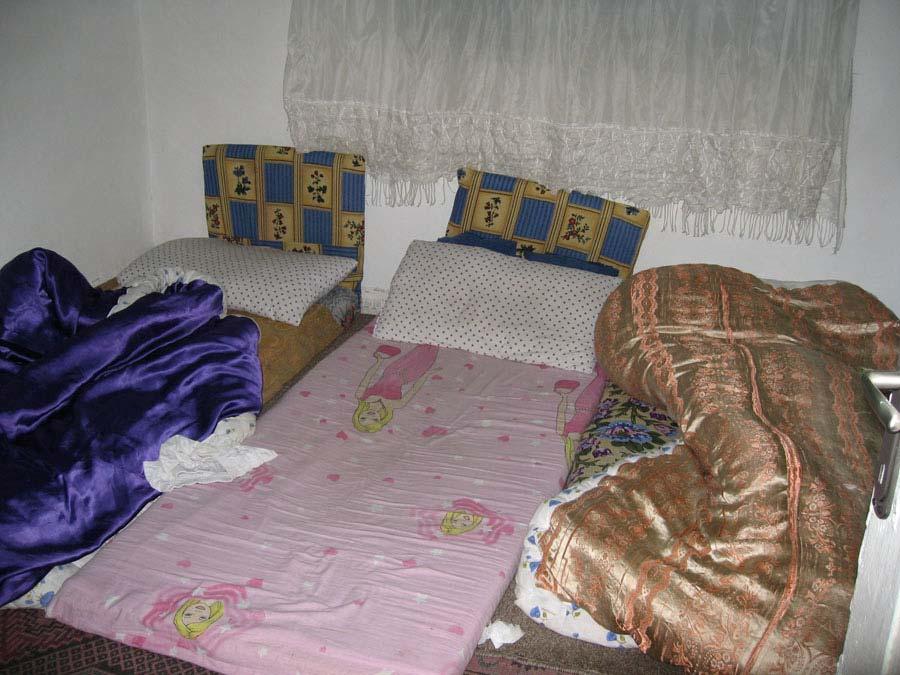
Daily Life
In Turkey, eight years of primary education is mandatory and public schools are free. Aykut wakes up around six-thirty to go to school. Sometimes he does not have time for breakfast which generally consists of tea, bread and cheese. He washes up and puts his blue school uniform with white collar on top of his clothes. School has two sessions. Aykut attends the morning shift, which starts at 7:30 AM. It can be very cold in the morning. Grabbing his backpack, he runs down the hill from his house, across the main street and two more blocks. He has a break mid-morning, which is a time he uses to eat lunch served by the school. The morning session ends at 12:30 (Figure 1.8).
First, Aykut said math was his favorite topic. His grades were very good. However, during a return visit the following year, the family could not locate him for a follow-up interview. As it turned out, he was hiding because he was failing in mathematics in 6th grade. However, he called back in the spring to announce that his grades were up and that he had passed all his courses.
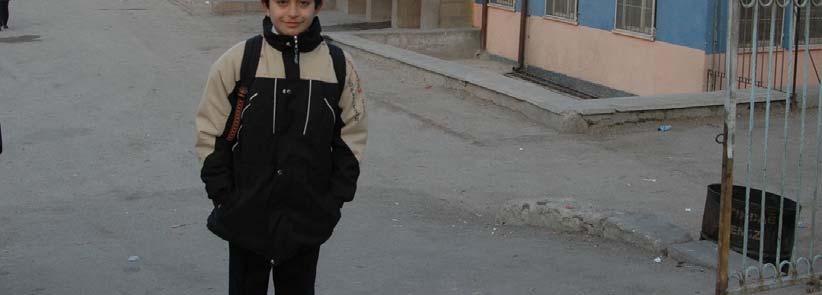
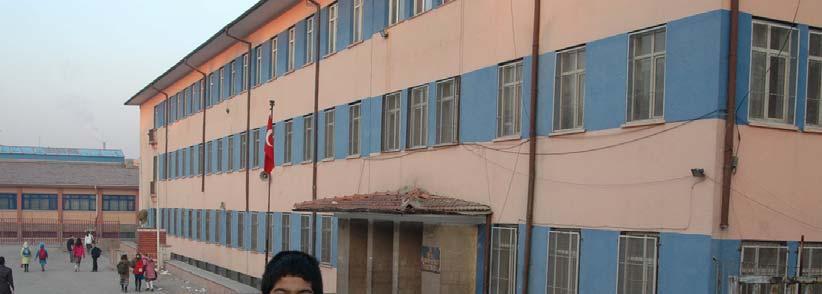
Aykut also goes to the school when he is troubled about something. Then he sits in the school yard by himself. When asked what kinds of things may trouble him, he was at first vague, but eventually suggested that these could be disagreements with his friends or family.
After school, Aykut goes home. He then often changes into his sweat suit to play soccer with his friends. When there is a tournament, he plays in the school soccer team on the field behind the school. The soccer field is just a barren lot, and Aykut says ”I will put in turf when I become rich.” Other times they play on the street in his neighborhood. Aykut’s favorite possession is his soccer shoes. They do not last for more than a month of serious playing. However, new ones are costly, so he does not always have “proper” shoes for soccer.
Aykut also goes to the community center everyday, where he participates in the activities it offers. He likes playing computer games there. Staff there also help with homework (Figure 1.9).

“I like school work. I am bored when teachers don’t give any homework.”
Early in the fieldwork, Aykut was singing Turkish folk songs (Türkü) in the choir at the Center. He said he liked listening to cassette recordings of regional folk music at home. He played a lively folk song while his three-anda-half year old kid sister danced a “halay.” Later, when asked what kind of music he listened to, he replied “mostly hymns.” He did not say how religious music entered his entertainment repertoire as a teenage boy. These are touchy topics in Turkey these days (See also endnote 2).
At 5:30 in the afternoon, Aykut picks up his younger brother from school, where he attends the afternoon shift, and then they walk home together. Aykut knows lots of people in his neighborhood. He has uncles and cousins who live close by, and he also knows the owners of stores who live in adjacent homes. His best friend lives down the street.
He is also on good terms with many people at the two local markets, where he works each weekend and every weekday during summer time (Figures 1.10 and 1.11). Talking about his work there, Aykut observes:
“Most vendors and other workers in the market know me. I also have regular customers. I go to collect candy and pocket money from them on holidays.”
Aykut often runs errands for his mother and for his neighbors whenever they ask him to go the grocery store, to the butcher, or to the “Russian Market.” These markets, which sprang up in Turkey after the break-up of the Soviet Republic, are visited by Russians who come with suitcases to buy cheap goods which they take back to sell at home. Locals also shop at these places. He knows his way around, all the way to Yenidogan, to Ulus (old city center). He knows where to buy what for the least price. The stationary store on the main street is one of his favorite stores. The owner rolls his eyes when he sees him because he visits so often to view the latest mechanical pencils, notebooks, soccer balls and other stuff attractive to children at his age.
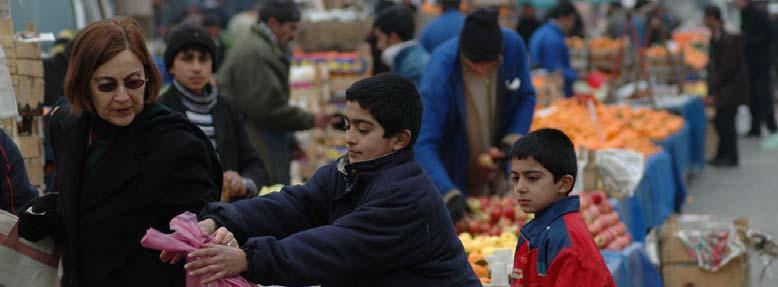
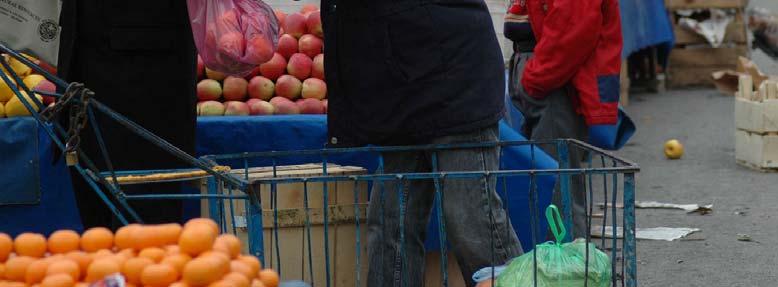
Aykut’s Neighborhood
On the whole, Aykut likes his neighborhood. While he is well aware of the low quality of most of the housing, he says:
“It is a nice environment. The streets are not dirty, except when cats get into garbage bins. And it usually is pretty safe during daylight hours. There are lots of children on the streets and people sit outside when the weather is good.”
Aykut’s father and mother agree. They say that they are happy in this neighborhood. His parents are known as good neighbors, even though they are renters. They say:
“People keep an eye on each other. During the day it is pretty safe but it is not a good idea to be out and about at night. But the police also know us, and they come and help if and when needed.”
However, the other day, when Aykut was walking with his younger brother, a gang member came lurching towards them, asking for money, shaking a knife in his hand. He was not from their neighborhood and clearly on drugs. According to Aykut:
“There was this man coming towards us, he was unsteady on his feet and had a knife in his hand. I told Eyup, (his younger brother) you run, fast. Then I grabbed the man’s wrist back to his back and shook the knife free.”
When asked how he dared to resist this man with a knife in his hand,” he replied:
“Oh, he looked stoned, so it was not difficult. Besides right then, some other man came and separated us. Then I walked back home.”
Just before this incident, there had been another scare, when a car was burned down a couple of streets away from his house. Its charred remains were still there. “Such things happen around here,” noted Aykut. His biggest concern is for his safety and that of his family and friends. His parents try to keep him at home after darkness falls.
The Future
When asked what he sees in the years ahead, Aykut answers:
“If I am rich when I grow up, I will say: “Tear these houses down and build beautiful ones.” These houses leak, everything about them is broken down. My house does not leak, because my father fixed it. He repaired the roof, all the walls, painted the inside, built the toilet and tiled the floor. He knows construction.
My neighbors own their houses but we rent ours. My mother’s greatest wish is to own a house. If we owned this house, my father could fix it even more. The landlord does not want to sell it because he thinks he can make more money in the future if the government decides to tear down this neighborhood.”
He knows that it will not be easy to get better housing and move to a better neighborhood. It will take hard work, but he is prepared for that. Already he is doing what he can, working on weekends during the school year and all week during the summer vacation and giving his earnings to his parents (Figures 1.12 and 1.13):
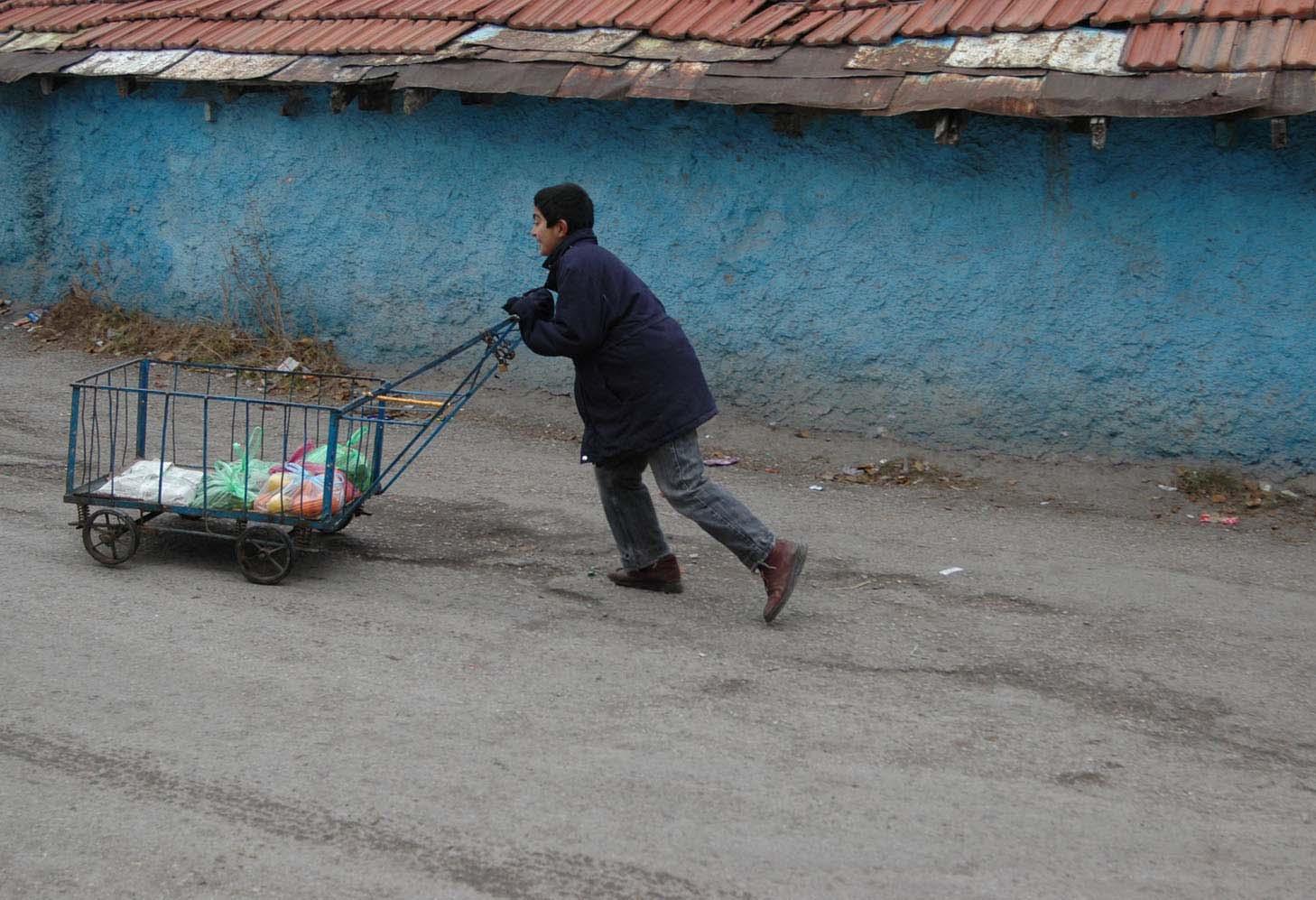
“I go to work in the weekends during the school year at the weekly markets. I have a cart and help people carry groceries home. One of the markets is close by and the other one is an hour-and-a-half away; I just put one foot on the cart and push it with my other foot like a skateboard all the way to the market and back. In the summers, I work five days a week and rest for the other two days, because I do get very tired.”
Although he gets tired, Aykut is not complaining and reveals a broader sense of purpose. Talking about his family, school, and what the future holds for him, he says:

“Being with my family and doing school work make me happy. If I cannot do my school work, that makes me unhappy. In the future if I have a good position, I will concentrate on my work and take care of my workers and help the poor.”

Endnotes
1. Edited field report prepared by Fahriye Hazer Sancar. Photographs by Beysun Gokcin.
2. Families, such as Aykut’s, are especially affected by the “faith-based volunteerism” doctrine of the ruling party that effectively transferred provision of after school and remedial education, social services, employment opportunities from central government bureaucracy to local governments and the various “non-governmental organizations” working as extensions of the party apparatus on the ground.
3. However, in May of 2008 we learned that Aykut’s sister was getting married at age 16. When asked, she said that she had no objections and had agreed to this marriage willingly. In these situations, usually the new wife will move in with her in-laws. Aykut’s family will receive an agreed upon sum of money (ba lık parası) in return for her hand in marriage.





